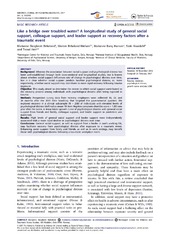| dc.contributor.author | Birkeland, Marianne Skogbrott | |
| dc.contributor.author | Nielsen, Morten Birkeland | |
| dc.contributor.author | Hansen, Marianne | |
| dc.contributor.author | Knardahl, Stein | |
| dc.contributor.author | Heir, Trond | |
| dc.date.accessioned | 2017-04-28T09:23:18Z | |
| dc.date.available | 2017-04-28T09:23:18Z | |
| dc.date.issued | 2017 | |
| dc.Published | Birkeland M, Nielsen MB, Hansen M, Knardahl S, Heir T. Like a bridge over troubled water? A longitudinal study of general social support, colleague support, and leader support as recovery factors after a traumatic event. European Journal of Psychotraumatology. 2017;8:1302692 | eng |
| dc.identifier.issn | 2000-8066 | |
| dc.identifier.uri | https://hdl.handle.net/1956/15741 | |
| dc.description.abstract | Background: Whereas the association between social support and psychological distress has been well-established through both cross-sectional and longitudinal studies, less is known about whether social support influences rate of change in psychological distress over time. Nor is it clear whether social support predicts baseline psychological distress, or, more importantly, whether social support may contribute to more rapid recovery following trauma exposure. Objective: This study aimed to determine the extent to which social support contributed to the recovery process among individuals with psychological distress after being exposed to trauma. Methods: Prospective survey data from ministry employees were collected 10, 22, and 34 months after the 2011 Oslo bombing that targeted the governmental quarters. We explored recovery in a clinical subsample (N = 238) of individuals with elevated levels of psychological distress (defined as mean 10-item Hopkins symptom checklist score > 1.85) one year after the event. A linear latent growth curve of psychological distress with general social support from friends and family, colleague support, and leader support as predictors was examined. Results: High levels of general social support and leader support were independently associated with a more rapid decline in psychological distress over time. Conclusions: General social support, as well as support from a leader in one’s working life, may facilitate recovery from psychological distress after exposure to a traumatic event. Enhancing social support from family and friends, as well as in work settings, may benefit those with psychological distress following a traumatic workplace event. | en_US |
| dc.language.iso | eng | eng |
| dc.publisher | Taylor & Francis | eng |
| dc.rights | Attribution CC BY | eng |
| dc.rights.uri | http://creativecommons.org/licenses/by/4.0 | eng |
| dc.subject | Trauma | eng |
| dc.subject | terrorism | eng |
| dc.subject | psychological distress | eng |
| dc.subject | growth curve analysis | eng |
| dc.subject | LGM | eng |
| dc.title | Like a bridge over troubled water? A longitudinal study of general social support, colleague support, and leader support as recovery factors after a traumatic event | eng |
| dc.type | Peer reviewed | |
| dc.type | Journal article | |
| dc.date.updated | 2017-03-28T12:12:43Z | |
| dc.description.version | publishedVersion | |
| dc.rights.holder | Copyright 2017 The Author(s) | eng |
| dc.identifier.doi | https://doi.org/10.1080/20008198.2017.1302692 | |
| dc.identifier.cristin | 1460429 | |
| dc.source.journal | European Journal of Psychotraumatology | |

